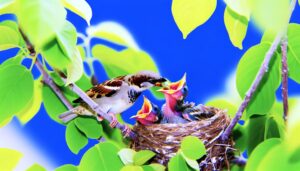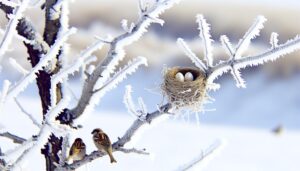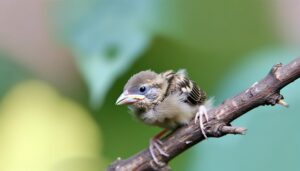How You Feed Baby Sparrows Grits Safely?
Feeding grits to baby sparrows can aid digestion but shouldn't be their main food source. Baby sparrows need protein-rich insects and small invertebrates for best growth.
Grits help break down food in the gizzard but aren't nutritionally adequate alone. Use finely ground, plain grits sparingly to avoid digestive issues.
Ensure hydration through moist food or water. Monitor their weight and feather development for dietary adequacy.
The right balance of protein, fats, carbohydrates, vitamins, and minerals supports healthy growth. There's a lot more to ponder to grasp the full dietary requirements and safe feeding practices.
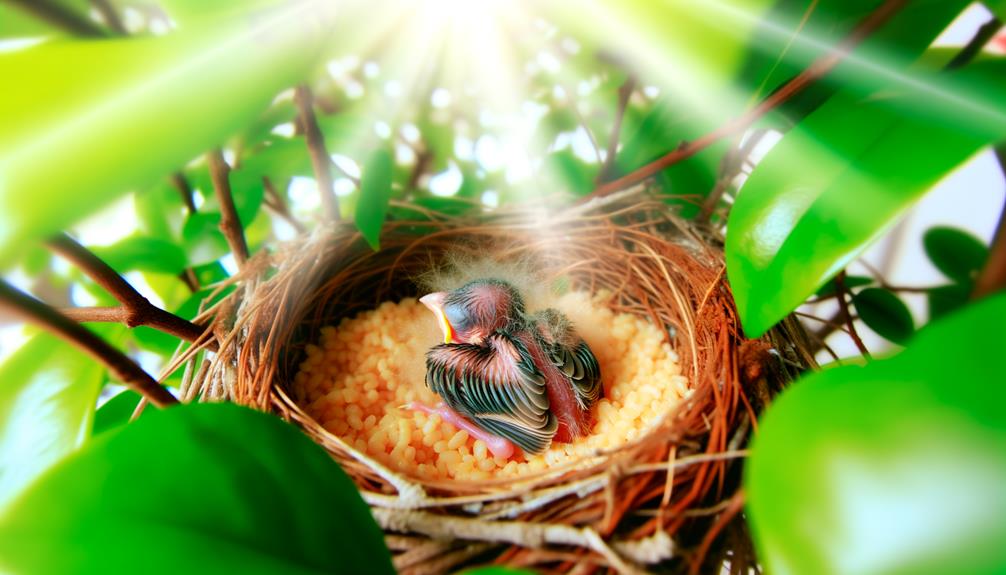
Key Takeaways
- Grits are not a food source but aid in digestion.
- Finely ground grits can be safe but should be used sparingly.
- Avoid flavored or salted grits to prevent health issues.
- Grits are unnecessary if the diet includes soft, digestible foods.
- Overuse of grits can lead to nutritional imbalances and digestive problems.
Understanding Baby Sparrow Diet
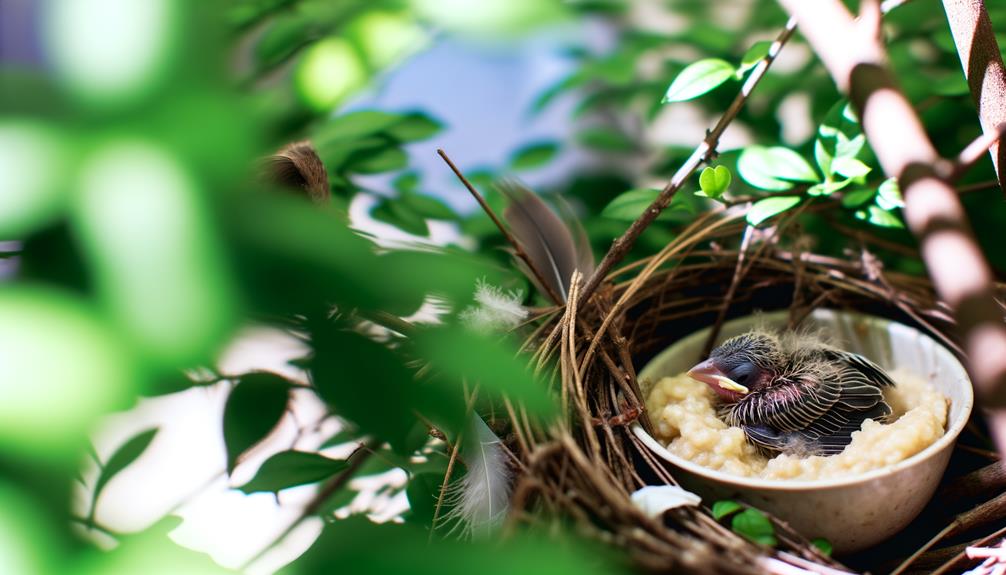
Understanding the dietary needs of baby sparrows is important for guaranteeing their proper growth and development. You need to provide a diet that mimics what they'd receive in the wild. Typically, baby sparrows consume protein-rich insects and small invertebrates, important for their rapid growth.
Avoid feeding them solely on seeds or grains, as these lack essential nutrients. Hydration is also crucial; guarantee they get water indirectly through their moist food. You can use a syringe or dropper to administer small amounts of water if necessary.
Monitoring their weight and feather development can help gauge if their diet is adequate. Always aim for a balanced diet to promote strong bones, healthy feathers, and an overall robust immune system.
Nutritional Needs of Fledglings
As fledglings evolve from nestlings, their nutritional needs become more diverse, requiring a mix of protein-rich insects and nutrient-dense seeds to support their continued growth and energy demands. You'll need to provide a balanced diet to support the best possible development and essential liveliness.
| Nutrient | Source |
|---|---|
| Protein | Insects (mealworms) |
| Carbohydrates | Seeds (millet, sunflower) |
| Fats | Nuts (crushed peanuts) |
| Vitamins | Fruits (berries) |
| Minerals | Grit (crushed shells) |
Protein aids muscle development, while carbohydrates supply energy. Fats are important for feather health and insulation. Vitamins from fruits boost immune function, and minerals like calcium and phosphorus support skeletal growth. By catering to these needs, you'll be fostering a healthy, robust young sparrow.
What Are Grits?
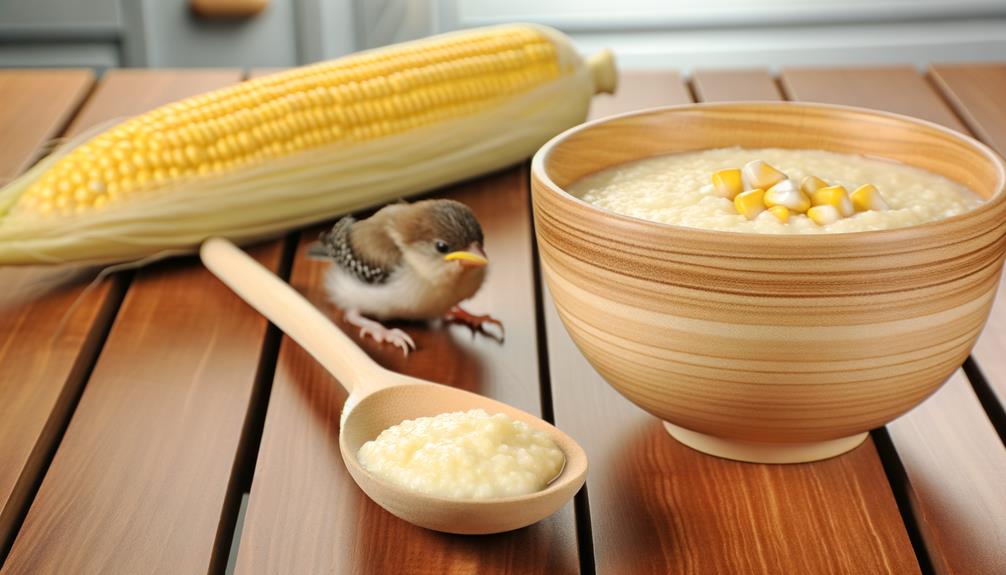
Grits are small, hard particles that birds ingest to help grind and digest their food in the gizzard. These particles can be sand, small stones, or even manufactured grit specifically designed for birds. When a bird swallows food, it passes into the gizzard, a specialized stomach chamber. Here, the ingested grits work like a millstone, breaking down tough food particles into digestible pieces. This process is essential for birds, especially those that consume seeds and hard-shelled insects.
As someone who cares deeply about the well-being of animals, it's important to understand that grits aren't a food source but a digestive aid. Providing appropriate grit can support the natural digestive processes of birds, ensuring they receive the nutrients they need from their diet.
Are Grits Safe?
Securing the safety of grits for baby sparrows involves understanding the specific types and sizes of grit that are suitable for their delicate digestive systems. Grits should be finely ground to avoid causing any harm or blockages in the young birds' esophagus and crop.
When offering grits, consider the following:
- Particle Size: Guarantee the grits are finely ground to prevent choking or digestive issues.
- Purity: Use unseasoned, plain grits without added salts, sugars, or flavors to avoid toxicity.
- Frequency: Limit the amount of grits provided, as overfeeding can lead to nutritional imbalances.
Risks of Feeding Grits
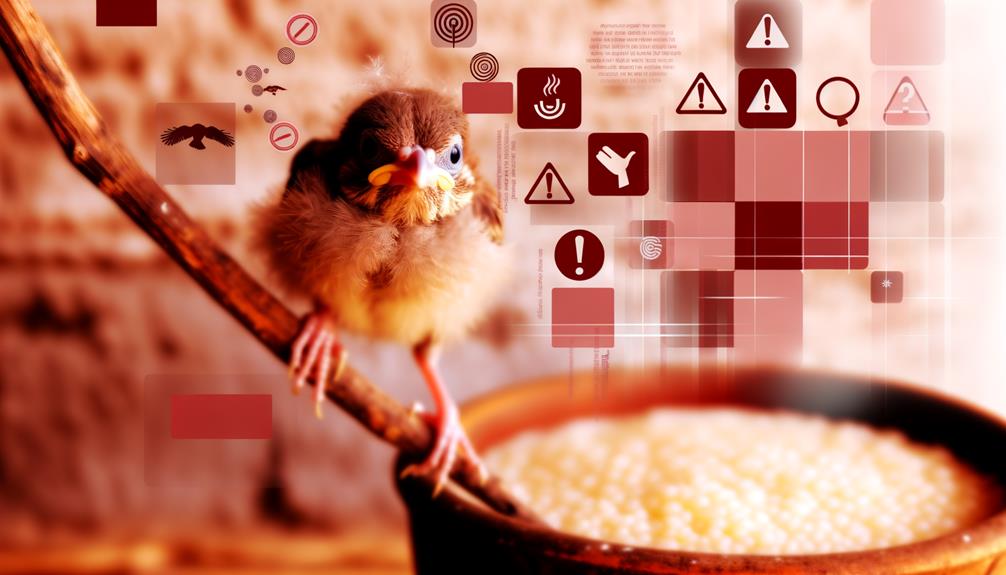
When feeding baby sparrows grits, you should consider the risks of nutritional deficiencies, as grits lack essential vitamins and proteins.
Additionally, their digestive systems may struggle to process grits, potentially leading to gastrointestinal distress.
There's also a risk of choking, since grits can form clumps that small birds might find difficult to swallow.
Nutritional Deficiency Concerns
While grits may seem like a convenient food option, they lack necessary nutrients that baby sparrows need for proper growth and development. Feeding them grits can result in nutritional deficiencies, which can have serious consequences. Baby sparrows require a balanced diet rich in proteins, vitamins, and minerals.
Grits don't provide:
- Proteins: Important for muscle development and overall growth.
- Calcium: Essential for bone formation and strength.
- Vitamins: Essential for immune system function and metabolic processes.
Digestive System Issues
Feeding baby sparrows grits can disrupt their delicate digestive systems, leading to potential blockages and malabsorption issues. Grits, composed mainly of ground corn, lack the necessary enzymes and nutrients required for a sparrow's prime digestion.
The incomplete breakdown of these particles can cause intestinal obstructions, impeding the absorption of essential nutrients like proteins and minerals. Additionally, the high carbohydrate content in grits can ferment within the gut, fostering harmful bacterial growth.
This imbalance in gut flora may result in gastrointestinal distress, further compromising the bird's health. To optimize baby sparrows' well-being, you must provide them with a diet specifically formulated for their physiological needs, avoiding substances that could harm their fragile digestive tracts.
Potential Choking Hazards
In addition to digestive issues, giving baby sparrows grits poses significant choking hazards due to their coarse texture and large particle size. These young birds lack the developed muscular control to effectively manipulate and swallow such large and rough particles.
The risk factors include:
- Aspiration: The grits can easily be inhaled into the airway, causing respiratory distress or fatal blockage.
- Esophageal Obstruction: The large particles may lodge in the esophagus, preventing further intake of food or water.
- Inefficient Digestion: Even if swallowed, the coarse grits can damage the soft tissues of the digestive tract.
To ensure the health and safety of baby sparrows, it's important to provide them with appropriately sized and textured food.
Suitable Food Alternatives
You should consider insect-based diet options like mealworms and crickets, which provide essential proteins and fats.
Additionally, examine nutritional supplement choices to guarantee the baby sparrow receives adequate vitamins and minerals.
These alternatives support healthier development compared to feeding grits.
Insect-Based Diet Options
When considering an insect-based diet for baby sparrows, mealworms and crickets provide important proteins and nutrients that are essential for their growth and development. Offering these insects can guarantee the young birds receive a balanced diet rich in amino acids and vitamins.
Incorporate these options into their feeding regimen:
- Mealworms: High in protein and easy to digest, they're an excellent source of energy.
- Crickets: Packed with essential nutrients, they contribute significantly to the sparrow's dietary needs.
- Ant eggs: Rich in protein and fatty acids, they support healthy growth.
Understanding the nutritional benefits of these insects helps you provide prime care for baby sparrows, guaranteeing they thrive and grow strong. Prioritizing their dietary needs shows your commitment to serving these delicate creatures.
Nutritional Supplement Choices
Considering nutritional supplement options guarantees baby sparrows receive essential nutrients when insect choices are limited.
You can provide boiled eggs, finely chopped, which are rich in proteins and essential amino acids.
Commercially available baby bird formulas, specifically designed for passerines, offer balanced nutrition with vitamins and minerals.
Additionally, soaked dog or cat kibble can serve as a temporary protein source, but make sure it's low in sodium.
Avoid feeding dairy products, as sparrows can't digest lactose.
Vitamin supplements, particularly those with Vitamin D3, are vital for bone development.
Always make sure any food provided is at room temperature to prevent thermal shock.
Preparing Insect-Based Diets
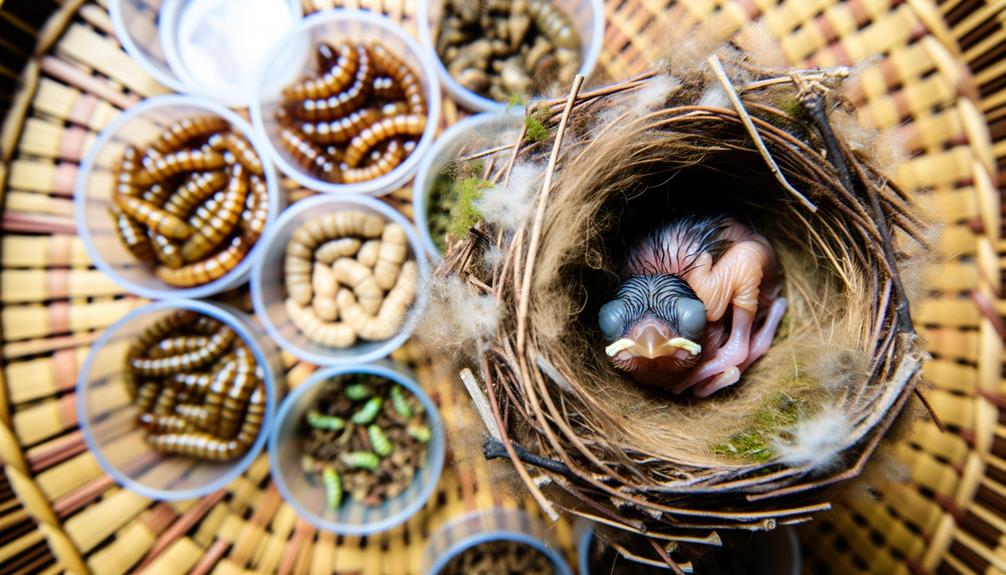
To prepare an insect-based diet for a baby sparrow, start by selecting a variety of high-protein insects such as mealworms, crickets, and fly larvae. Confirm these insects are clean and free from pesticides. You'll need to chop the larger insects into small, manageable pieces to prevent choking hazards.
Here's what you need to do:
- Crush or finely chop the insects to guarantee easy consumption.
- Mix the insect pieces with a small amount of water to create a moist consistency.
- Feed the baby sparrow using a pair of tweezers or a dropper.
Using Commercial Bird Foods
When considering commercial bird foods for baby sparrows, it is important to compare the nutritional value to natural diets to guarantee thorough nourishment.
Check the safety and ingredient list to avoid harmful additives and guarantee species-specific compatibility.
Follow feeding frequency guidelines meticulously to prevent overfeeding or nutritional deficiencies.
Nutritional Value Comparison
Comparing the nutritional value of commercial bird foods to natural diets reveals significant differences in protein, fat, and essential vitamins. Commercial bird foods often contain formulated blends that guarantee a balanced intake of necessary nutrients.
However, natural diets, such as insects and seeds, provide:
- Higher protein content: vital for growth and development.
- Natural fats: essential for energy and maintaining healthy feathers.
- Vitamins and minerals: naturally present to support immune function and bone health.
While commercial options are designed to mimic these benefits, they may lack the complexity and variety found in a wild diet.
You should carefully weigh these differences when deciding on the best dietary choices for baby sparrows, working towards meeting their specific nutritional needs effectively.
Safety and Ingredients
Understanding the safety and ingredients of commercial bird foods is paramount when selecting them for baby sparrows. Guaranteeing the right nutrients while avoiding harmful components is essential. Examine the ingredient list for essential vitamins, minerals, and protein. Steer clear of additives, preservatives, and artificial coloring, as these can be harmful to a baby sparrow's health. Below is a table summarizing key components to look for and avoid:
| Essential Nutrients | Safe Additives | Harmful Ingredients |
|---|---|---|
| Protein | Natural Antioxidants | Artificial Colors |
| Vitamins A, D, E | Probiotics | Preservatives |
| Calcium | Enzymes | High Sugar |
| Omega-3 Fatty Acids | Fillers |
Prioritize commercial foods designed specifically for baby birds to guarantee balanced nutrition and safety.
Feeding Frequency Guidelines
To maximize growth and health, baby sparrows should be fed commercial bird foods multiple times a day at regular intervals. You'll need to feed them every 15 to 20 minutes during daylight hours for the first week. Gradually extend the intervals as they grow older.
Consistent feeding guarantees they receive adequate nutrients and energy for peak development.
Key guidelines to follow:
- Early Days: Feed every 15-20 minutes.
- Weeks 2-3: Feed every 30-45 minutes.
- Weeks 4-6: Feed every 1-2 hours.
Monitor their crop (a pouch in their throat) to ensure it's not overly full or empty. Regular feeding prevents malnutrition and supports robust growth.
Always use commercial bird food tailored for young sparrows to secure balanced nutrition.
Hydration Needs
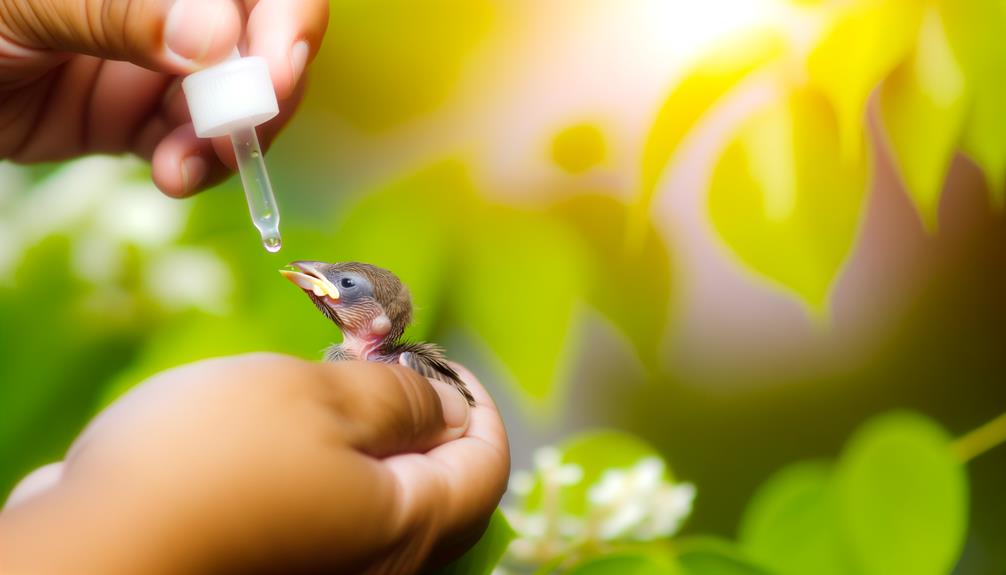
Ensuring proper hydration for baby sparrows is vital for their development and overall health. Baby sparrows require consistent hydration to support their metabolic processes and nutrient absorption. You should provide clean, lukewarm water using a dropper or syringe, avoiding direct force to prevent aspiration. Hydration frequency should align with feeding schedules, typically every 2-3 hours.
| Time of Day | Hydration Frequency |
|---|---|
| Morning (6 AM – 12 PM) | Every 2 hours |
| Afternoon (12 PM – 6 PM) | Every 2-3 hours |
| Evening (6 PM – 12 AM) | Every 3 hours |
Monitoring their hydration status is vital. Check their droppings; well-hydrated sparrows produce moist, clear feces. Never rely solely on solid foods for hydration—they don't provide sufficient water content.
Recognizing Signs of Malnutrition
Recognizing signs of malnutrition in baby sparrows involves closely observing their physical condition, behavior, and growth patterns. You must be vigilant for indicators such as weight loss, lethargy, and abnormal feather development.
Healthy growth is paramount, and deviations can suggest nutritional deficiencies.
Look for these key warning signs:
- Weight Loss: Weigh the sparrow regularly. Significant drops in weight can indicate inadequate nutrition.
- Lethargy: A malnourished sparrow may exhibit reduced activity and prolonged periods of inactivity.
- Feather Abnormalities: Poor feather quality, stunted growth, or feather loss can be signs of malnutrition.
Feeding Frequency
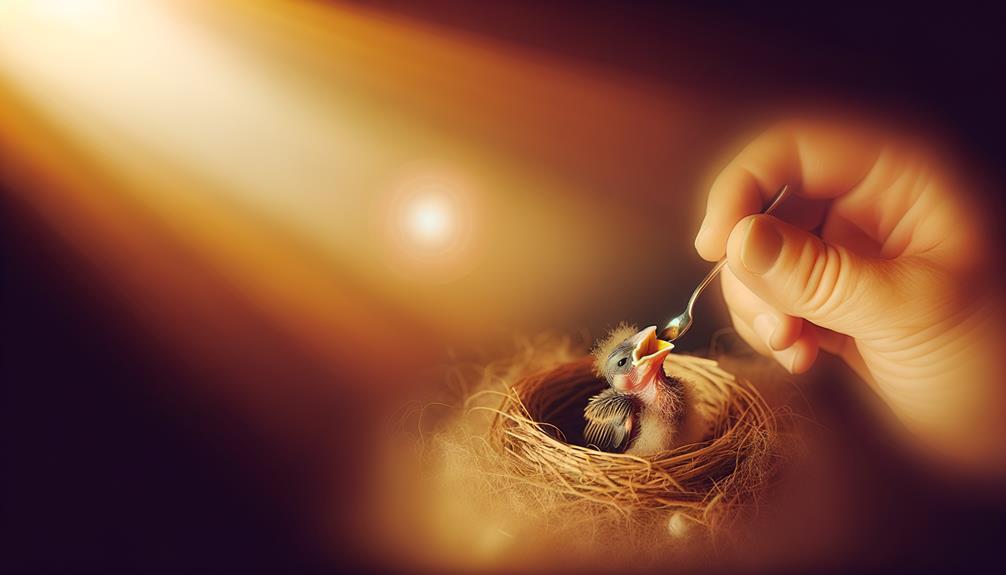
Feeding frequency is critical for the best growth and health of baby sparrows. You should feed them every 15-20 minutes from sunrise to sunset. This mimics their natural feeding pattern and guarantees they receive sufficient nutrition. Sparrows have high metabolic rates, so consistent feeding prevents hypoglycemia and promotes peak development.
Use a small syringe or dropper to deliver food directly into their mouths. Monitor their crop—an expanded, food-filled area at the base of their neck—to make sure it's not overfilled, which can cause digestive issues. Cleanliness is paramount; always sanitize feeding tools to prevent bacterial infections.
Adjust feeding intervals as the bird grows, gradually extending the time between feedings to align with their natural maturation.
Transition to Adult Diet
Gradually shifting baby sparrows to an adult diet is crucial for their successful development into fully independent birds. You'll need to start this shift when the sparrows are about three weeks old.
Begin by introducing small amounts of adult foods like seeds and insects while still providing their regular hand-feeding formula. This process should be done incrementally to make sure they adapt smoothly.
Key steps for the change include:
- Varied Diet: Slowly mix seeds, grains, and insects into their meals.
- Observation: Monitor their eating habits and health closely to detect any issues early.
- Gradual Reduction: Decrease the amount of hand-feeding formula as they consume more solid food.
Conclusion
To summarize, grasping a baby sparrow's diet is pivotal, feeding them grits isn't recommended. Grits lack vital nutrients and can present significant risks, similar to a nutritional desert.
Prioritize their hydration requirements and watch for signs of malnutrition. Feed them regularly to guarantee proper growth and shift them gradually to an adult diet.
By following these guidelines, you're fundamentally holding the key to their survival and flourishing future.



